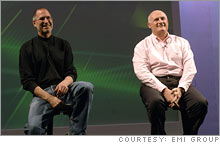EMI-Apple in deal to sell protection-free musicMusic company is partnering with Apple to sell music catalog free from copy protection, but the Beatles aren't part of the deal.NEW YORK (CNNMoney.com) -- EMI Group PLC. announced a deal Monday with Apple Inc.'s iTunes to sell its music catalog without the anti-piracy protection known as DRM restrictions. But Beatles fans have to keep waiting for songs from the Fab Four to be available online. EMI, which owns the Beatles catalog, said that music from the Beatles is not part of the deal with Apple.
The Beatles are one of the few remaining digital music holdouts and there had been speculation that Monday's announcement would be about the Beatles' albums finally becoming available on iTunes. The London-based music company said it would make the downloads, including songs from top artists such as Coldplay, Norah Jones, Pink Floyd and the Rolling Stones, available for retail on a global basis. "Selling digital music DRM-free is the right step forward for the music industry," Steve Jobs, Apple's (up $0.42 to $93.33, Charts) CEO, said in a statement. "EMI has been a great partner for iTunes and is once again leading the industry as the first major music company to offer its entire digital catalogue DRM-free." During a press conference Monday in London, Eric Nicoli, the CEO of EMI Group, said that he expected music sales for his company to increase because the DRM-free tracks will have better sound quality and will be easier to transfer from one device to another. "Many consumers find it frustrating that they don't have interoperability," Nicoli said. Tracks without DRM will cost consumers extra however - songs without DRM will sell for $1.29 a download on iTunes versus standard prices of 99 cents per download. James McQuivey, a media technology analyst with Forrester Research, said Apple's agreement to charge more than 99 cents for a track is significant because Jobs has been extremely critical of the music companies' efforts to increase the price for digital downloads and has rebuked the labels' attempts to increase prices in the past. McQuivey added that this deal makes perfect sense for Apple since it should allow Apple to sell more downloads on iTunes because it will be easier for consumers using any music device, not just the iPod, to use iTunes. And EMI should benefit, McQuivey said, from higher prices as well as the perception that is a more technologically savvy and consumer friendly company. "This is a perfect marriage of interests," McQuivey said. "It satisfies everybody's needs." Jobs said at the press conference that EMI deserves a lot of credit for being the first major label to sell music without DRM protection. He would not comment on whether other labels were talking with Apple about selling their music without DRM. Jobs stressed that EMI's decision was a good first step for the music industry that made sense since the big four music labels - Sony BMG, which is a joint venture of consumer electronics giant Sony (Charts) and German media firm Bertelsmann, Warner Music Group (Charts), Vivendi-owned Universal Music and EMI - already sell CDs without DRM protection. "Customers get what they want and music companies will make a little more money by offering more value. Everybody wins here," Jobs said. EMI's move comes almost two months after Jobs wrote an open letter to the music industry on Apple's Web site urging the labels to drop DRM. Another music industry expert said the announcement from Apple and EMI could spur the other big record labels to also abandon DRM. "It's about time. This is a welcome step in the right direction and it's pro-consumer," said Bob Kohn, chairman and CEO of RoyaltyShare, a Web-based royalty processing firm for the music industry. "This will put pressure on other labels to at least release some of their music in a non-DRM format." Kohn was also a co-founder of eMusic, an online music subscription service which competes with iTunes and was bought by Universal in 2001 and then sold to private-equity firm Dimensional Associates in 2003. But Jobs added that Apple is not looking to sell videos without DRM just yet, however. The company currently sells movies and TV shows from several entertainment companies. Copyright protection for video is still a major concern for the top media firms. Viacom (Charts), which owns cable networks MTV and Comedy Central, sued Google (Charts) and its online video sharing subsidiary YouTube for copyright infringement last month and is seeking $1 billion in damages. In addition, media firms News Corp. (Charts) and GE's (Charts) NBC Universal announced last month that they were teaming up to launch an online video service to compete with YouTube that would feature content from the libraries of the two companies. CNNMoney.com senior writer Parija B. Kavilanz contributed to this report. |
Sponsors
|

